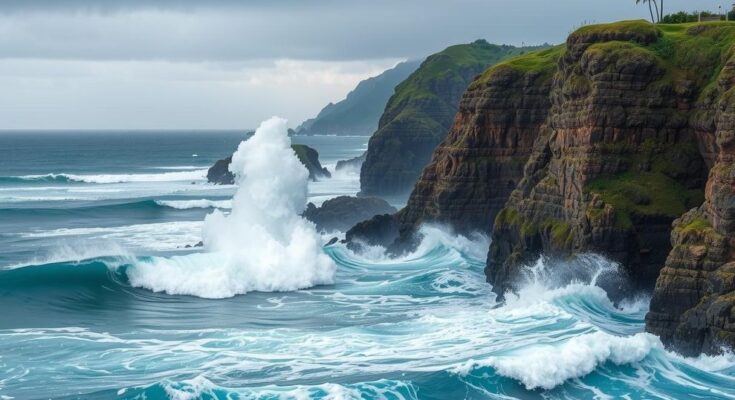Severe waves up to 13 feet have affected the coasts of Ecuador and Peru, leading to port closures and at least two deaths. This extreme weather event has also caused significant damages, particularly to the fishing industry, and was attributed to climate change. Authorities have emphasized the potential for recurring occurrences of such severe conditions.
Severe waves measuring up to 13 feet have struck the coasts of Ecuador and Peru, leading to the closure of numerous ports and resulting in at least two fatalities. Jorge Carillo, Ecuador’s secretary for risk management, stated that this “extreme event” could repeat in the future. The deaths were confirmed in the Manta region of Ecuador. Reports from Peru indicate that the constant pounding of the waves has led to the closure of nearly all ports, as enforced by the head of the naval Oceanographic Department, Enrique Varea.
The Peruvian Civil Defense unit attributed the aberrant wave patterns to climate change, with Larry Linch emphasizing this point. Peruvian authorities reported significant property damage, where images depicted submerged jetties and public squares, forcing local residents to seek refuge on higher ground. The waves have been generated off the US coast by surface winds, and as a precaution, beaches along central and northern Peru have been closed.
Reports indicate substantial damage to the fishing fleet, with approximately 100 boats destroyed. Fishermen in perilous weather conditions sought assistance as the navy rescued 31 stricken fishermen on Saturday, with estimates suggesting that around 180 more fishermen remain at sea. The inclement weather phenomenon began on Christmas Day and is projected to persist until January 1. Concerns regarding the economic impact of these waves have been raised, particularly by Mayor Roberto Carrillo Zavala of the La Cruz district.
The recent severe wave phenomenon affecting the coasts of Ecuador and Peru highlights the growing concerns associated with climate change and severe weather events. Experts suggest that the unusual wave activity, characterized by heights reaching 13 feet, are becoming more frequent due to changes in the climate. Fishing communities are particularly vulnerable, as maritime conditions worsen and ports are rendered inoperative, thereby threatening their livelihoods. The Portuguese Coast Guard reported damage and operational challenges as local authorities strive to ensure community safety and environmental stability.
In conclusion, the extreme wave event impacting Ecuador and Peru manifests the growing urgency surrounding climate change and its consequences. The closures of ports and the tragic loss of life underscore the need for heightened awareness and preparedness in coastal regions. As local authorities take measures to manage the current crisis, continued attention to climate-related impacts on fishing and maritime activities remains vital for the affected communities.
Original Source: www.hindustantimes.com




